The legacy of Buffy the Vampire Slayer has remained so powerful over the near twenty years it has been off the air not because of its lack of faults, but because of its strengths. Its faults were aplenty. It did not trade in intricate, watertight plotting. It had no capability for visual spectacle. Its worldbuilding has the consistency of wet souffle. These aspects always – always – gave way to the three things that formed Buffy’s bread and butter, and that it has to thank for its surviving relevance. Metaphor, theme, and above all characterisation. This show is good at character. Characters that people like, characters that are interesting, characters with thematic purpose, characters who are enjoyable to watch on a television screen. Sometimes, all of the above. This is the triumvirate of qualities Buffy trades in, and the only aspects really worth judging it on: metaphor, theme and characterisation.
This is the episode that reunites the main cast – that brings together the characters we care about after splitting them apart – a prime opportunity to tug at heartstrings and help us understand the importance of these characters to each other, and to the story they are together telling. Such heartstrings are tugged when we see Buffy return to Giles’ apartment. First when Giles opens the door to Buffy, and sees her, home and safe. It is a moment that reminds us of the familial nature of Giles’ love for her – as it serves a direct parallel to her mother opening the door to her last episode – and is made ever sweeter by Anthony Steward Head’s microexpressions. He cements his status as one of the show’s truly elite actors as he is able to convey such depth of emotion with no words, and barely any facial movement.
There is a moment in this scene, around seven minutes in, that illustrates the show’s grip on character perfectly. Giles brings a tray of tea to the kitchen, and we zoom in on his face, and we see it. The relief. The suppressed joy at hearing Buffy back – his house and existence now suddenly full of life again. Knowing she is safe, and the twofold relief in knowing that he has not failed, either as a Watcher or as a Father to Buffy. A beautiful, pure moment that both relies on existing characterisation and feeds into it. It is a moment that reminds us of everything we already know about the Buffy/Giles dynamic, and a moment we will be reminded of when we see more of it in future. This is the show flexing its primary weapon. An understanding of its own characters, and the skill to make their emotions feel real – to draw us into the world and become connected to those that inhabit it.
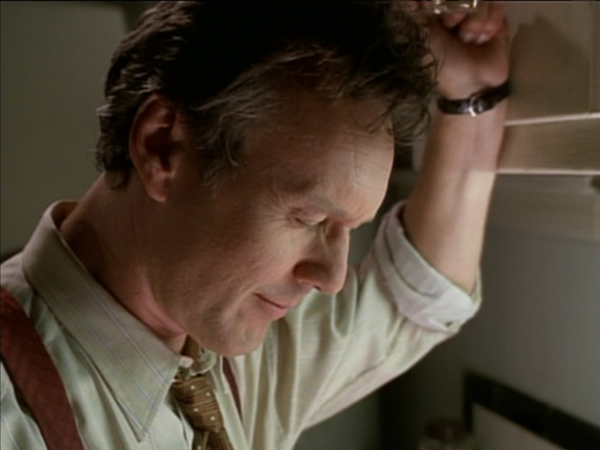
And then we have the rest of Dead Man’s Party.
Here is the blunt edge of this episode that preemptively strikes at any attempt to talk about it with analytical distance: the Scoobies are, put succinctly, dicks. This epithet mainly applies to Willow, Xander, and Joyce – but of all the cast only Giles really escapes this episode with sympathy intact. The rest of them are simply bad friends. They are avoidant from the offset – apparently preferring schoolwork and a date night to spending any time with a friend who had been AWOL and perhaps dead for three months. They plan a party in her house that anyone who has spent five minutes with Buffy would know she does not want. Willow stands her friend up when they arrange to go for coffee, and later, when Buffy considers leaving again, rats her out to Joyce. Joyce embarasses her daughter publicly, guilt-trips her for making the “bad choice” of running away, and offers no regrets for being the one who actually kicked her out. Xander bitches about Buffy behind her back, sides with her mother, and scolds her as she is on the verge of tears. Their behaviour is, simply put, shitty.
There is nothing wrong with this in isolation. Characters who are shitty and unfair to other people are perfectly valid characters to write. In fact, most of television’s most iconic leads fall under such a definition, as Bryan Cranston’s Emmys will attest to. This season of television itself introduces a character who is often shitty and unfair to those around her, and she is one of the most successful and beloved characters in the show. This could be a good story to tell. However, it needs to be told well. The first hurdle is that the show must understand the story it is telling. And at this hurdle, it falls.
Before understanding an episode’s failures, we must first understand its purpose. The central purpose of Dead Man’s Party is to bring the main cast back together and tie up any emotional loose threads from the previous season. By this point, this kind of episode is an essential column in the show’s structure.
Buffy’s season openers are rarely actually the beginning of the season arc (this is a job usually delegated to episode 3 or 4). Openers are more likely to be responding to last season’s arc. Just as When She Was Bad dealt with Buffy’s trauma after the events of Prophecy Girl, this episode – alongside Anne – serves as an epilogue to Becoming – addressing the questions left open by the finale and closing the book on that chapter, before the actual season premiere airs next week. We saw this structure before and we’ll see it again. Recognising this approach is key to understanding Buffy’s role in televisual history as it has transformed from a series of distinct standalone stories, to ongoing, bingeable arcs with episodes that pick up directly after each other.
When She Was Bad successfully executes one of fiction’s more difficult plays – writing a character who is both Sympathetic and Wrong. It often makes for a powerful character when it succeeds, but it is a difficult line to thread. You must display enough flaws for the character to be genuinely challenging, but not so many that they become truly distasteful. You must construct the narrative to not be so sympathetic to them that it falls prey to woobification, but sympathetic enough that it avoids being didactic. There is an ever-shifting sweet spot, and no clear rules on how to hit it. When She Was Bad manages to do so. We see Buffy’s worst qualities as she lashes out at people who do not deserve it, while keeping the POV close enough to Buffy and her traumas that we still yearn for her absolution.
It’s easy to imagine a version of Dead Man’s Party that tells a similar story from the Scoobies’ point of view. It would be appropriate, given that Anne shifted the Scoobies into the ‘Buffy’ role, for them to carry on with an arc that evokes Buffy’s own reactions to trauma. We could have seen a fascinating role-swap, with the Scoobies lashing out at a Buffy who doesn’t really deserve it, making mistakes, while the POV is kept close enough to them that we understand why they are acting this way, and the traumas that are feeding into it. Or you could repeat When She Was Bad, and show Buffy at her worst again. Or show them all making mistakes and being equally awful and equally sympathetic. There are many directions to take.
This episode almost takes the first of these. The Scoobies (here and through most of this essay meaning “Willow, Xander, and Joyce”) lash out at Buffy and display their worst qualities, while Buffy, for her part, is mostly faultless. I am not someone who believes that Buffy Summers is always faultless – I believe the strength of her character comes largely from her flaws – but she does pretty well in this episode. There is some amount of typical-Buffy-Summers emotional avoidance – her insistence that nobody could understand her pain while she stubbornly refuses to share that pain for example – but this only really comes out after the dogpiling in the living room begins – a dogpiling so overwhelming and severe that it would require saintliness to not become defensive in response to it. Prior to this, she actively seeks emotional honesty from Willow, and attempts to bond in ways that are shut down by Willow – first when Willow stands her up, and later at the party. She brings out a little of her cruel tongue towards Xander – but again, only after repeated scoldings from him that have brought her to the point of tears. She is kind and respectful before this. It would not be difficult to write an in-character scene in which Buffy is equally at fault as the Scoobies, but the episode goes out of its way to ensure that this is not the case.
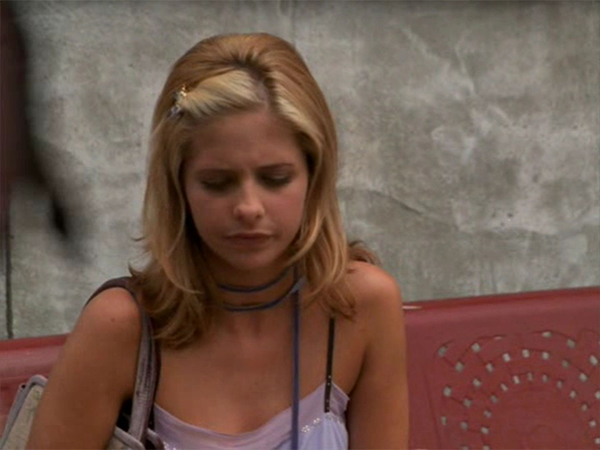
There are plenty of reasons to remain sympathetic towards the Scoobies. They have valid reasons to feel hurt. They were abandoned for months, were forced to worry about Buffy’s safety and health when one simple letter could have put their minds at ease. From Joyce’s point of view, she is being made to suffer months of torment in response to a slip of the tongue she didn’t really mean, after having her entire understanding of the world undone. From Willow and Xander’s POV, they not only have to deal with the emotional betrayal of Buffy cutting them out, but they have had to take up the responsibilities that Buffy left behind – fighting vampires and the forces of darkness. Buffy’s absence from the show does not nullify her calling, it just shifts the responsibility onto other people. Willow and Xander suffer the same theft of their free will that Buffy did when she was called, only they have to do it without superpowers.
However, it is difficult to sympathise with the Scoobies’ point of view when the episode itself has no interest in it. In order for this story to work, we would need to spend more time with the Scoobies, following their POV and putting us in their shoes. We got a little of that last episode, with Buffy absent.
This episode, however, is told entirely from Buffy’s POV. As soon as she comes back, she is the POV character. From her finding the gang again, through getting stood up by Willow, to the party, we are always following Buffy, and being reminded of her traumas and her point of view. This primes us to see the following arguments from her point of view and sympathise most with her. We do not need to, as Cordelia suggests, put ourselves in Buffy’s shoes, because we are already in them. We needed, at some point, to be put in Xander’s shoes, and we are not. This is not an impossibility – the show will do exactly that this season. The closest we get is Willow’s speech about not having Buffy to talk to about the events in her life – a potentially interesting thread that tugs at Willow’s insecurities over being the sidekick and not the main character, but one that feels small potatoes since a) we only hear about it late in the drama, and b) Willow’s argument is undercut by the fact she actively avoided talking to Buffy earlier on.
All of which would still not be a fatal problem if the episode ended with the Scoobies admitting fault and apologising. That hypothetical episode would be rather dull and didactic, but it would not be so infuriating. The frustration with this episode comes not from the fact that characters within it act poorly, but that the narrative seems ignorant to what itself has shown. The episode ends with Buffy taking full responsibility, handing Willow “moral superiority”, and accepting verbal admonishments in the form of (rather out-of-character) sassy name-calling. It suggests that the reason that Willow and Buffy couldn’t get coffee together early on and can now is because Buffy has now admitted to being in the wrong, while Willow has not taken any steps. This is the wrong note to end the episode on. Not because Buffy is objectively in the right and Willow in the wrong – but because the rest of the episode is invested in Buffy’s POV. With one hand it shows us why we should feel bad for only Buffy, and with the other hand it tells us we should feel bad for only the Scoobies. That is always going to feel jarring to the audience.
Moreover, the episode fails at what its central purpose is meant to be – providing resolution to the events of Becoming. Buffy suffers two arguable betrayals in that episode – Joyce kicking her out of the house, and Xander’s Lie. These are major emotional beats that are left up in the air at the end of season two, and both are evoked in the living room blowout.
“But you told me! You’re the one who said I should go. You said if I leave this house, don’t come back. You found out who I really was, and you couldn’t deal. Don’t you remember?”
Buffy Summers, 3×02 Dead Man’s Party
“As if I even could’ve gone to you, Xander. You made your feelings about Angel and I perfectly clear.”
Buffy Summers, 3×02 Dead Man’s Party
Both of these are brought up, and then quite quickly breezed by. Joyce gives an excuse that puts blame directly back on Buffy, and no more. As soon as we get close to The Lie, it is kicked all the way down to Selfless. It is not where the episode lands on these issues that is a problem, but that lack of care given to addressing them. It is ironic, given that the episode’s central metaphorical point is “you need to talk about things and not bury them”, that the episode gets so close to two topics that require major examination, and then immediately buries them and never talks about them again.
This episode is significant in the wider context of the show – not because the issues it raises go on to be addressed (they don’t), but because of how it relates to the ongoing theme of division between Buffy and the Scoobies. There is a notable trend in the fandom to see Willow and Xander as “bad friends”, and this episode as part of a wider pattern of the Scoobies being overly critical of Buffy. “The Scoobies don’t deserve Buffy” is a train of thought I see often, and for all my frustrations with this episode, it’s not one I agree with. I think it ignores both the many instances of the Scoobies being demonstrably excellent friends (such as in the aforementioned When She Was Bad), as well as ignoring the thematic purpose of the Buffy/Scoobies split as it relates to Buffy’s role as the Slayer and her (partially self-)imposed isolationism.
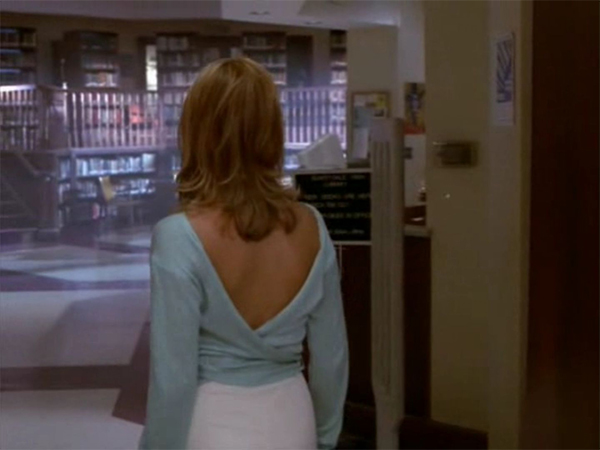
There are two other instances of major Buffy-Scooby blowouts in living rooms that this episode serves as a comparison to: The Yoko Factor and Empty Places. You could call this the Blowout Trilogy – but what’s interesting is that there is not actually a consistency to them – least in the way that I feel about them. The former is actually the sole successful implementation of this trope between the three episodes, while the latter fails for entirely different reasons than this episode does. They demonstrate how different constructions of the same fundamental story can result in wildly different effects on the audience, and how I don’t think the Buffy/Scooby dynamic can ever be boiled down to anything as simple as “X is always in the right and Y is always in the wrong”.
Whenever we see a split between Buffy and her friends, we should consider not only their roles as characters within the fiction, but as symbolic representations of Buffy herself. They are her mind, spirit, and heart. When they express emotions, they always are doing so on two levels – as themselves, and as part of Buffy.
The symbolic level grants us the most redemptive reading of this episode. Giles’ behaviour is unimpeachable here. He expresses his love for Buffy and relief that she’s back without overwhelming her. He notes and respects her boundaries in not immediately sharing what happened to her. He is the only one in favour of the intimate gathering that Buffy would actually enjoy over the party she would not. He ends the episode using his leverage to help Buffy get back into school and the regular life she desires. Xander and Willow are positioned in opposition to him in most of these instances.
What we can understand from this therefore is that while Buffy’s Mind is accepting and forgiving of her, her Heart and Spirit blame her fully. She is conflicted within herself. Her experiences in Anne have shown her that she should not blame herself for what happened with Angel, and intellectually, she knows this. She understands in her mind that she did nothing wrong. But her heart is still in pain, and she lacks the force of spirit to defend herself with any passion. She knows she did nothing wrong, but feels like she did. She has not resolved her guilt, merely subsumed it into her subconscious, where it will control her for the rest of the season.
“You can’t just bury stuff, Buffy. It’ll come right back up to get you”
Xander Harris, 3×02 Dead Man’s Party
The central metaphor ties into this. The zombies represent repressed emotions, which if not dealt with, will rise up when you least suspect it, and cause more damage than they would if you had simply dealt with them. There is nothing objectionable about this metaphor, simplistic though it is. However, the execution of this metaphor causes it to undercut itself. The Scoobies’ argument, in which they are bringing up and airing their emotions, is interrupted when the zombies attack. The resolution of their emotional issues is literally interrupted by the metaphorical representation of their emotional issues. The literal is stomping all over the metaphorical.
They solve this problem by killing the Big Evil Demon in charge, which results in all their metaphorical issues literally disappearing into thin air. The resolution comes after Buffy works out that she needs to close her eyes (to avoid the demon’s Magic Eye Powers), evoking a reference to Becoming that would be fascinating if only the episode dug into it just a little. As it is, it’s merely a hilarious reminder that the heroes solve their problems in this episode with the power of wilful ignorance. That’s the answer this episode gives, and it’s one that could not be less of a resolution to Becoming if it tried. Close your eyes, stab blindly, and all your metaphorical problems will just go away.
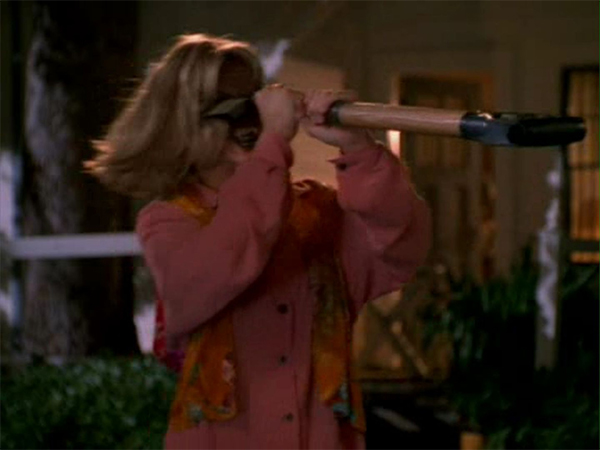
And here on the literal level, this is what happens. After the fight, Buffy and the Scoobies share some awkward compliments, and then hug, and boom. Episode over. Issues resolved. Zombie metaphor dissipated. No need to deal, onto the next episode. It’s such a complete inversion of what the episode seems to want to say that I would almost accuse it of being intentional. If it was, it would be genius. Indeed, it would fit the fact that Buffy has demonstrably not dealt with her emotional issues, and is right on the cusp of meeting the ultimate symbol of her own repression.
However. Assuming intentional genius requires a level of trust in the author’s competence that the shoddy construction of the episode ensures we cannot grant. Assuming unintentional genius requires enough good will to bestow a redemptive reading, and the frustrations that this episode inspires sucks all good will away. Ending the episode with an unironic condemnation of Buffy wipes out any chance this redemptive reading had. Metaphors fail, and characterisation torpedoes the themes. Episodes like this are special. It’s bad not because of an overload of the show’s weaknesses, but because of a failure of its strengths. And that, even more than any behaviour from either Buffy or the Scoobies, is truly unforgivable.
* * *
Thanks for reading! If you enjoyed this piece, please consider supporting me on Ko-Fi!
* * *
Thank you to juanabaloo on Tumblr for her help typo-checking this essay.
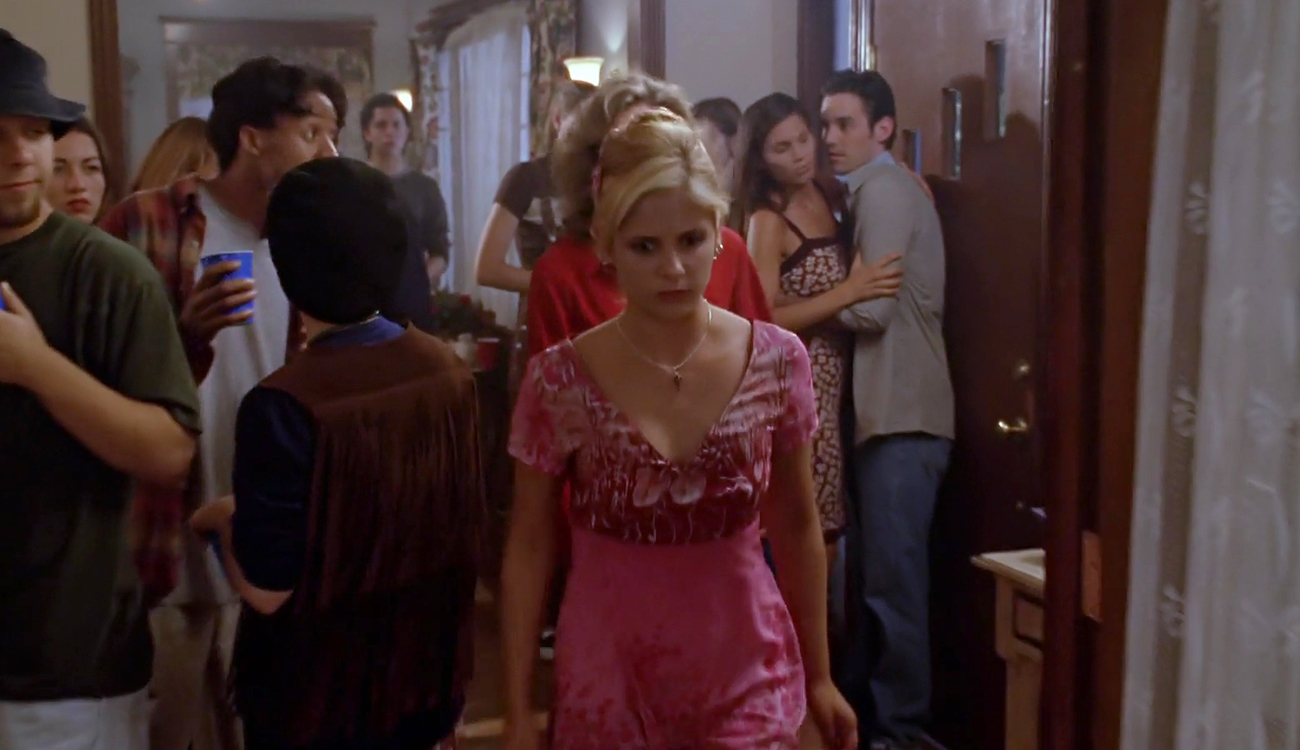
I want to like this episode, and when I remember only fractions of the concept of the episode and a couple of fraught exchanges, I still like the episode – as it exists in my head, not as it actually was.
Buffy’s mom still being kind of terrible even after she threw her out – great, good!
Buffy’s friends having their own resentment to work through and really not understanding how traumatised Buffy was and still is and how much they’re hurting her – great good!
This episode – Not good!
compare to the gut punch (for willow) of the “I think I was in heaven” moment. iirc i kept waiting for a similar reveal here, for them to find out just what buffy had to go through and why she was so broken, and yet that never happens.
LikeLike
The comparison to S6 is an interesting one. Here, the explicit discussion of Buffy and the Scoobies’ trauma after her metaphorical death in Becoming is snipped off after two episodes, and that truncated nature leads to episodes like this. Whereas S6 spins the exploration out over the whole season – especially those first 7 episodes – which lets them be much more careful in exploring everyone’s reaction to Buffy’s death and resurrection.
LikeLike
I’ve been able to accept or at least make sense of this episode only when I extend the thematic reading you cover (Buffy’s mind out of sync with her heart and spirit) to the more direct – that the episode is told from deep within Buffy’s POV and therefore what we see isn’t a literal reflection of what’s occurring, and instead is a reflection of her guilt.
This runs into the not insignificant problem that there really is little evidence that it’s a technique that BtVS used at all, let alone consistently.
LikeLike